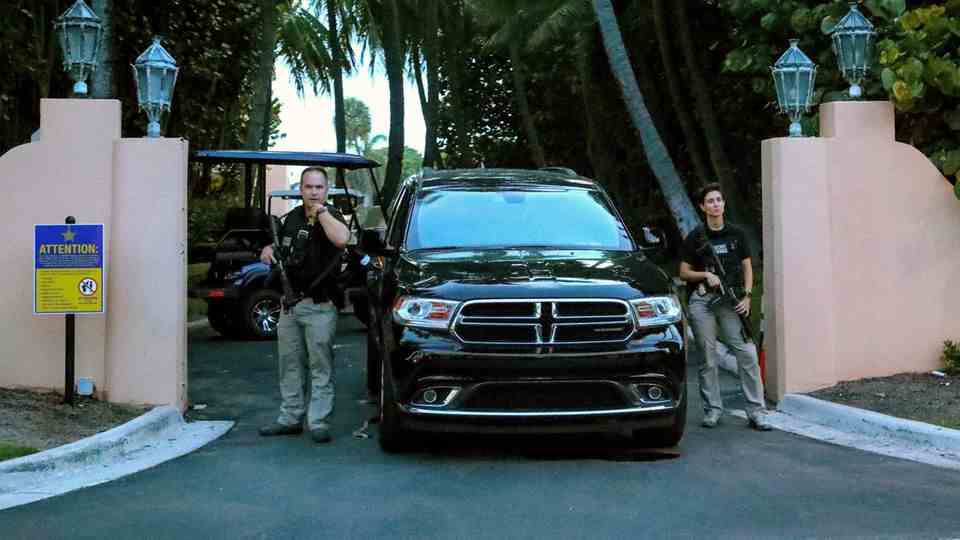Raid on ex-US President
Espionage, obstruction of justice – that is what Trump faces if he is convicted
The FBI’s receipt for the documents confiscated from Donald Trump.
© Jon Elswick/AP/DPA
After the raid on Donald Trump’s Mar-a-Lago estate, the former US President could be investigated for espionage. That would be bizarre enough. More serious, however, is the accusation of obstruction of justice against him.
The battle for authority to interpret this unprecedented house search had begun long before the Chevi Suburbans had completely left the FBI’s Mar-a-Lago. Donald Trump, who followed the raid at his home live on surveillance cameras from New York, spoke of “dark times”. His son Eric lamented the ongoing hunt for his family on Fox News: “Nobody got more arrows in the back than we did.” That set the tone that was still being played up and down by conservatives, Republicans and the Trump-friendly media days later: the ex-president’s enemies, Democrats, left-wing activists, even “the state” want him finished before the next elections make.
Almost all documents were top secret
Meanwhile, some Trump supporters are not afraid to question the legality of the house search. Although, from what is known, it was initiated through normal legal process. With the permission of suspect Trump, the federal police even published details, which is unusual in ongoing proceedings. This report shows that, among other things, sets of documents classified as “Top Secret/SCI” were found at his property in Florida, which are top secret and may only be viewed in special government institutions. Four of the documents seized were classified as “top secret”, three as “secret”, and three as “confidential”.
“If you or I had boxes of classified information sitting around at home, the federal police would not politely ask for it, they would just take possession of the material and we would have to face very serious lawsuits,” writes the US site “Politico” to the raid. And the crucial question is: what exactly is the former head of state accused of and what consequences await him? The legal ramifications may not be clear.
Donald Trump charged with espionage?
It starts with the search warrant. It does not reveal what exactly the investigators were looking for, but mentions the laws on which the raid was based: criminal handling of government files, obstruction of justice, and violation of the US Act of Espionage. The latter also includes the collection, transmission or loss of defense information. To date, no charges have been filed on any of these counts. But her mention points to the direction of the FBI investigation, and “what will occupy investigators for the next few weeks,” journalist Sadie Gurmann told PBS.
The fact that a former US president is being investigated for espionage seems bizarre, but the accusation of obstruction of justice could be legally more serious, as “Politico” writes. Because apparently there is a statement from the Trump legal team to the Department of Justice that the material marked as secret has been completely returned to the government. If it turns out that “a lawyer deliberately lied to the government, that would be a criminal offense,” the US website said. And the question arises at whose behest the statement was made. “Should investigators be able to prove that Trump personally obstructed the investigation, this could certainly lead to an indictment,” Politico said.
The alleged attorney’s letter could also explain why the FBI conducted the raid in the first place. Because there were already negotiations between Donald Trump and the FBI about the return of the documents in advance. In May, for example, representatives of the federal police traveled to Florida and spoke to the ex-president and his lawyers there. Even after the house search, Trump himself asserted that he was always ready to hand over the documents. In February, he complied with a request from the National Archives to return 15 boxes of records from his time in the White House. Including a letter from North Korea’s dictator Kim Jong Un. The FBI began investigating in April after archivists in Washington reported the lack of further documentation.
Trump would have to plead ignorance
It is not yet clear whether Donald Trump will be charged and if so, for what crime. “Politico” points out that in the case of allegations of espionage, intent must generally be proven, which may be difficult in the case of the former president. His best line of defense might be “to protest that he really didn’t know he had secret documents stored at Mar-a-Lago, relying on the judgment of his staff,” the magazine said.
In any case, the planned penalties are tough: the Espionage Act provides for a maximum sentence of ten years in prison. If the judiciary is obstructed, there is even a risk of 20 years. Trump could potentially lose the right to run for public office. So also for the US presidency. At least that is what the law provides for in the event of the destruction of records.
Sources: DPA, AFP, PBS“politico”, CNN“New York Times“



